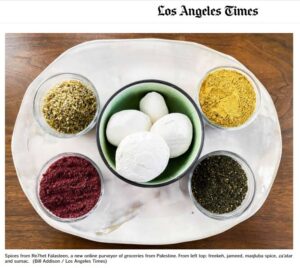- 268
- 271SHARES
April 4 UPDATE:
LA Times Publishes Corrected Version in Print Edition
While The Los Angeles Times has yet to make any modification to its online Feb. 27 article which contains multiple erroneous references to "Palestine," editors have published a corrected version of the piece in the print edition. In the March 28 Los Angeles Times print edition article, Addison's numerous references to "Palestine" have been removed. See below for a detailed update.
Over the span of nearly 15 years, The Los Angeles Times corrected erroneous usages of the term "Palestine" more than half a dozen times. But it seems that the paper's food department — of all places — has now set a new policy for itself, designating the West Bank as "Palestine." Thus, in his Feb. 27 food column, "The secret ingredient to a lavish Bedouin dish," Bill Addison repeatedly referred to the West Bank, which is partly controlled by the Palestinian Authority, as "Palestine."
Za’atar is the Arabic name for origanum syriacum, an herb native to the Levantine swath of the Middle East that includes Lebanon, Palestine, Syria, Jordan and modern-day Israel. . . .The grandma video was produced by Z&Z, a D.C.-based company that sells za’atar (the spice blend) produced in Palestine. I haven’t tried it yet. A new venture out of Brooklyn, though, is selling wonderful, fragrant za’atar and other products from Palestine that have been spurring my kitchen projects. . . .The business’s name translates as “the fragrance of Palestine.” . . .. . . spice blends for dishes like maqluba, Palestine’s celebratory dish of meats, vegetables and rice. . .It is loved in parts of Palestine as well as in other Middle Eastern countries.
CAMERA contacted The Times, noting that in the past the paper has been diligent about correcting erroneous references to either Israel, the West Bank or Gaza Strip as "Palestine." Examples of past corrections include:
Roger Waters: An article in the June 22 Calendar section about Roger Waters' new album said Waters supports Palestinians' rights but incorrectly referred to tensions between Israel andPalestine. It should have said tensions between the Israeli government and the Palestinians. (June 28, 2018)
An earlier version of this review cited music from Palestine; the text should have said music from the Palestinian territories. (Dec. 15, 2018)
Gerald A. Larue: In the Sept. 22 LATExtra section, the obituary of USC religious scholar Gerald A. Larue referred to archaeological digs in Palestine. The digs occurred in Israel and the West Bank. (Sept. 22, 2014)
Carter speech: An article in Friday's California section included a subhead saying former President Carter urged students to travel to Palestine. The area referred to is the Palestinian territories. (May 5, 2007)
Istanbul Biennial -- An article in the Dec. 11 Calendar section about an international art exhibition includedPalestinein a list of nations from which artists had contributed works. It should have said the Palestinian territories. (Dec. 23, 2005)
Bail bonds investigation–An article in the California section Sunday about the arrest of American Liberty Bail Bonds owner Adnan 'Dan' Yousef and members of his family reported that they had ties toPalestine. The reference should have been to the Palestinians territories. (Sept. 29, 2004)
Palestinian film–Articles about Palm Springs International Film Festival that ran in Calendar on Dec. 20 and Jan. 8 referred to the movie 'Divine Intervention' as coming fromPalestine. They should have said the Palestinian territories. (Jan. 13, 2004)
But the culinary columnist and the foodie editors at the paper doubled down on "Palestine," indulging with a second helping. In the March 7 print edition, Addison
One favorite that Now Serving carries is Whetstone, founded in 2017 by writer and "recovering sommelier" Stephen Satterfield and chef-consultant Melissa Shi . It embodies its mission statement -- "championing food to expand human empathy" -- with narratives about the fraught colonialist connections surrounding African foodways in Portugal, a revival of arak (the anise-flavored Levantine spirit) in Palestine and Salvadoran cooking in the diaspora.
April 4 Update: Print Edition Runs Corrected Article
Although the Feb. 27 online article is still uncorrected, editors published the article March 28 in the print edition and implemented the following changes:
• Instead of referring to "Za’atar is the Arabic name for origanum syriacum, an herb native to the Levantine swath of the Middle East that includes Lebanon, Palestine, Syria, Jordan and modern-day Israel. . . ." the print article states: "Za'atar is the Arabic name for origanum syriacum, an herb native to the Levantine swath of the Middle East."
• Instead of "The grandma video was produced by Z&Z, a D.C.-based company that sells za’atar (the spice blend) produced in Palestine. I haven’t tried it yet. A new venture out of Brooklyn, though, is selling wonderful, fragrant za’atar and other products from Palestine that have been spurring my kitchen projects. . . ." the print article states: "The grandma video was produced by Z&Z, a D.C.-based company that sells za'atar spice blend. I haven't tried it yet. A new venture out of Brooklyn, though, is selling wonderful, fragrant za'atar and other products that have been spurring my kitchen projects."
• Instead of "maqluba, Palestine’s celebratory dish of meats, vegetables and rice," the print edition states: "maqluba, a Palestinian specialty of meats, vegetables and rice."
• Instead of writing jameed "is loved in parts of Palestine as well as in other Middle Eastern countries," the print edition states: "that's a celebratory feast throughout the Levant."
• In addition, the photo and caption were changed, and do not refer to "Palestine."
The original sentence "The business’s name translates as 'the fragrance of Palestine'" remains intact in the print edition, a perfectly valid decision given that it is citing the name of the spice company. CAMERA commends the paper's move to get the terminology correct in the print edition, but continues to urge editors to correct the online edition, which remains available indefinitely.

